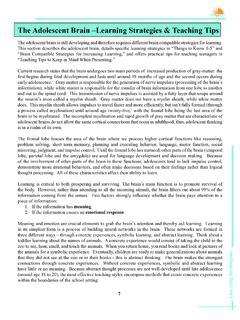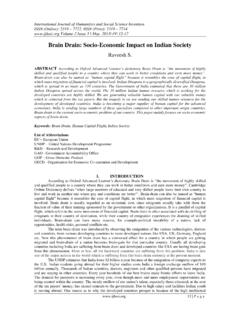Transcription of Developing Ideas for Your Essay - University of California, …
1 Developing and Sorting Ideas for your Essay There are many ways to develop an argument and to sort out your Ideas . While there are rules for formal essays , there are no fixed rules for the writing process, so you ll have to develop your own personal approach. Here are some suggestions for getting some words on paper and organizing your thoughts once you ve been given a prompt: Freewriting. Just sit down and start writing. The subject matter doesn t even have to be related to your topic. After you write something, look at the words and sense whether or not they really say what you are trying to express. This can even help you get other things off your mind so that you can focus on your assigned topic. As you write, gradually work your way toward the Essay .
2 Use this as a brainstorming exercise to get Ideas flowing (for more on this approach see Peter Elbow. 1998. Writing with Power: Techniques for Mastering the Writing Process. London: Oxford University Press). Brainstorming. List Ideas that you would like to include in the Essay as they come to you. Do not worry about organization at first. After you ve listed concepts, you can organize and arrange them, adding or taking away Ideas as needed. Brainstorming can also be effective when conducted in groups (Ann Raimes. 2005. Keys for Writers, 4th Edition. Boston: Houghton-Mifflin, ). Mapping. This technique can help you generate Ideas and connect them together. Place individual Ideas in boxes and connect them together with lines.
3 You might start with writing your topic in the middle of the page and draw a circle around it. Add additional boxes with Ideas that are related to your main topic and connect them to the center circle with lines. Repeat this process for each of the new circles, providing examples (Ann Raimes. 2005. Keys for Writers, 4th Edition. Boston: Houghton-Mifflin, ). Close Reading of the Text? If you are having difficulty generating Ideas for an Essay that involves analyzing a text, it may be the case that you have not engaged deeply enough with the reading. Try reading your text or parts of it more closely and this may help you make some connections. Putting your Paper Together. As you put your Ideas together into a formal Essay , consider writing to be part of a social process of communicating your understanding and sense of some topic to your audience.
4 For a formal Essay , you ll need to convey an understanding of the material, but you can assume your audience (professor, TA, and fellow students) has some basic knowledge of what you are talking about. Before you start writing, it can be very helpful to have all of the Ideas hierarchically organized in an outline in advance.








